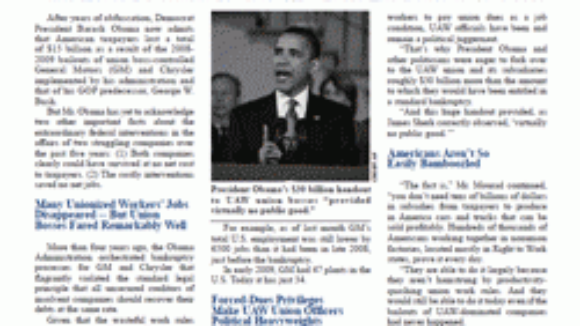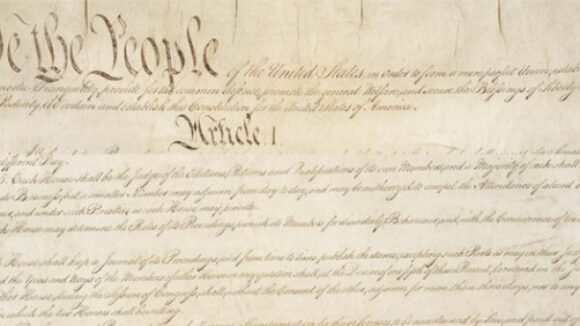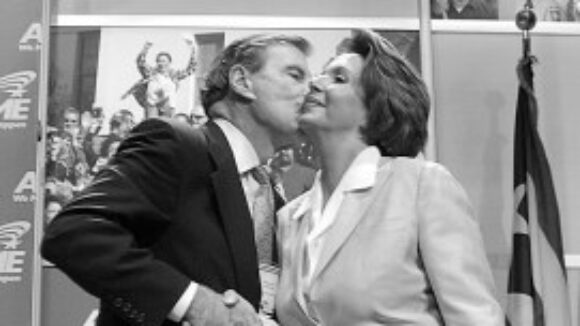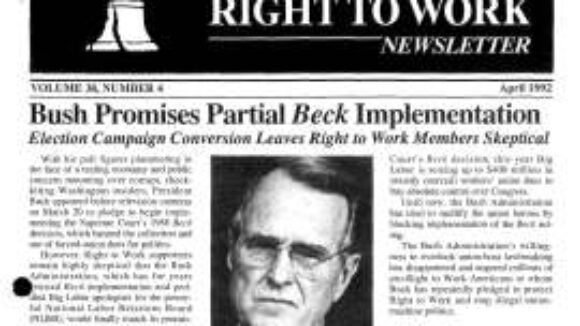Auto Workers Union Bosses Profit, Taxpayers Lose
White House Favoritism Towards UAW Brass Has Failed to Save Jobs (click to download newsletter) After years of obfuscation, Democrat President Barack Obama now admits that American taxpayers…

White House Favoritism Towards UAW Brass Has Failed to Save Jobs (click to download newsletter) After years of obfuscation, Democrat President Barack Obama now admits that American taxpayers…
Even President Obama now admits that American taxpayers lost a total of $15 billion as a result of the 2008-2009 bailouts of union boss-controlled General Motors (GM) and Chrysler implemented by his administration and that of his predecessor, George W.

Roger Pilon, a constitutional scholar from the CATO Institute, makes a compelling case that President Obama's outrageous appointments to the National Labor Relations Board and the Consumer Financial Protection Bureau are unconstitutional: All of Obama’s appointments yesterday are illegal under the Constitution. And, in addition, as too little noted by the media, his appointment of Richard Cordray to head the Consumer Financial Protection Bureau (CFPB) is legally futile. Under the plain language of the Dodd-Frank Act that created the CFPB, Cordray will have no authority whatsoever. Yesterday, Professors John Yoo and Richard Epstein, writing separately, made it crystal clear that the president, under Article II, section 2, may make temporary recess appointments, but only when the Senate is in recess. Add in Article I, section 5, and it’s plain that the Senate is presently not in recess, just as it wasn’t under Senate Democrats when George W. Bush wanted to make recess appointments. The difference here is that Bush respected those constitutional provisions while Obama — never a constitutional law professor but only a part-time instructor – ignores them as politically inconvenient. Attempts by Obama’s apologists to say the Senate is not in session are pure sophistry and, in the case of Harry Reid, rank hypocrisy, as this morning’s Wall Street Journal brings out. But clear beyond the slightest doubt is the language of the statute (itself unconstitutional on any number of grounds not relevant here). As my colleague Mark Calabria wrote yesterday, “authorities under the Act remain with the Treasury Secretary until the Director is ‘confirmed by the Senate.’” A recess appointment, even if it were constitutional, is not a Senate confirmation. There is simply no wiggle room in that language that gives Cordray any authority, as litigation will soon make plain.

Roger Pilon, a constitutional scholar from the CATO Institute, makes a compelling case that President Obama's outrageous appointments to the National Labor Relations Board and the Consumer Financial Protection Bureau are unconstitutional: All of Obama’s appointments yesterday are illegal under the Constitution. And, in addition, as too little noted by the media, his appointment of Richard Cordray to head the Consumer Financial Protection Bureau (CFPB) is legally futile. Under the plain language of the Dodd-Frank Act that created the CFPB, Cordray will have no authority whatsoever. Yesterday, Professors John Yoo and Richard Epstein, writing separately, made it crystal clear that the president, under Article II, section 2, may make temporary recess appointments, but only when the Senate is in recess. Add in Article I, section 5, and it’s plain that the Senate is presently not in recess, just as it wasn’t under Senate Democrats when George W. Bush wanted to make recess appointments. The difference here is that Bush respected those constitutional provisions while Obama — never a constitutional law professor but only a part-time instructor – ignores them as politically inconvenient. Attempts by Obama’s apologists to say the Senate is not in session are pure sophistry and, in the case of Harry Reid, rank hypocrisy, as this morning’s Wall Street Journal brings out. But clear beyond the slightest doubt is the language of the statute (itself unconstitutional on any number of grounds not relevant here). As my colleague Mark Calabria wrote yesterday, “authorities under the Act remain with the Treasury Secretary until the Director is ‘confirmed by the Senate.’” A recess appointment, even if it were constitutional, is not a Senate confirmation. There is simply no wiggle room in that language that gives Cordray any authority, as litigation will soon make plain.

Meanwhile, United Autoworkers Union Bosses Pocket $3.4 Billion (Source: May 2011 NRTWC Newsletter) In late 2008, GOP President George W. Bush "loaned" a total of $19.4 billion in federal taxpayers' money to the Big Labor-controlled General Motors Corporation (GM). Mr. Bush assured taxpayers they would get their money back. But by the spring of 2009, we learned we would never get back any of the money Mr. Bush had handed over to GM shortly before he left office. His successor as President, Democrat Barack Obama, announced GM would never have to settle up with taxpayers. President Obama simultaneously earmarked an additional $30 billion in taxpayers' money to by-then bankrupt GM. In exchange, taxpayers got a 61% stake in the money-losing company. Echoing Mr. Bush, Mr. Obama and his advisors insisted that, when the government eventually sold off its whole stake in GM, taxpayers would get the entire $30 billion back, and perhaps even reap a profit. Just last August, the President said it again. He told a CNBC interviewer: "We expect taxpayers will get back all the money my Administration has invested in GM." 'Government Officials Are Willing to Take the Loss'

Breaking Big Labor's stranglehold over federal labor policy will require far more than ousting union-label House Speaker Nancy Pelosi (D-Calif., shown here with government union czar Jerry McEntee) from the seat of power. Image Credit: Jay Mallin Survey Presses Candidates to Pledge to Roll Back Forced Unionism (Source: October 2010 NRTWC Newsletter) If respected Inside-the-Beltway political prognosticators like Charles Cook and Stuart Rothenberg are correct, there is a significant possibility that, come January, union-label Congresswoman Nancy Pelosi (D-Calif.) will no longer be speaker of the U.S. House. As of mid-September, Mr. Cook and Mr. Rothenberg were both reporting there was at least a 50-50 chance that Republicans would pick up, at a minimum, the 39 House seats they need to hold a majority in the chamber and, presumably, to elect a GOP speaker. Since virtually all Democratic politicians in Washington, D.C., rely on forced union dues-funded support from Big Labor to get elected and reelected, and few GOP politicians are similarly beholden to the union brass, a partisan House switchover would affect the climate for Right to Work-related legislation. For example, in all likelihood, the arrival of a GOP House would derail, for the time being, Big Labor's years-long campaign to mandate "card checks" or in some other way rig union organizing campaigns, and thus make it even harder for independent-minded employees to avoid being corralled into a union. However, if history is any indication, Republican House leaders are unlikely even to try to reverse federal policies that currently force millions of workers to accept monopoly union "representation," like it or not, and pay union dues or fees as a condition of employment. Unlikely, that is, unless pro-Right to Work citizens nationwide are mobilized in unprecedented numbers to put the heat on GOP politicians to act. Right to Work Movement Hasn't Forgotten About GOP's 1995-2007 Record "From 1995 through 2007, Republican politicians like Newt Gingrich [Ga.], Tom DeLay [Texas], Dennis Hastert [Ill.], and John Boehner [Ohio] were calling the shots in the U.S. House," recalled Doug Stafford, vice president of the National Right to Work Committee.

Breaking Big Labor's stranglehold over federal labor policy will require far more than ousting union-label House Speaker Nancy Pelosi (D-Calif., shown here with government union czar Jerry McEntee) from the seat of power. Image Credit: Jay Mallin Survey Presses Candidates to Pledge to Roll Back Forced Unionism (Source: October 2010 NRTWC Newsletter) If respected Inside-the-Beltway political prognosticators like Charles Cook and Stuart Rothenberg are correct, there is a significant possibility that, come January, union-label Congresswoman Nancy Pelosi (D-Calif.) will no longer be speaker of the U.S. House. As of mid-September, Mr. Cook and Mr. Rothenberg were both reporting there was at least a 50-50 chance that Republicans would pick up, at a minimum, the 39 House seats they need to hold a majority in the chamber and, presumably, to elect a GOP speaker. Since virtually all Democratic politicians in Washington, D.C., rely on forced union dues-funded support from Big Labor to get elected and reelected, and few GOP politicians are similarly beholden to the union brass, a partisan House switchover would affect the climate for Right to Work-related legislation. For example, in all likelihood, the arrival of a GOP House would derail, for the time being, Big Labor's years-long campaign to mandate "card checks" or in some other way rig union organizing campaigns, and thus make it even harder for independent-minded employees to avoid being corralled into a union. However, if history is any indication, Republican House leaders are unlikely even to try to reverse federal policies that currently force millions of workers to accept monopoly union "representation," like it or not, and pay union dues or fees as a condition of employment. Unlikely, that is, unless pro-Right to Work citizens nationwide are mobilized in unprecedented numbers to put the heat on GOP politicians to act. Right to Work Movement Hasn't Forgotten About GOP's 1995-2007 Record "From 1995 through 2007, Republican politicians like Newt Gingrich [Ga.], Tom DeLay [Texas], Dennis Hastert [Ill.], and John Boehner [Ohio] were calling the shots in the U.S. House," recalled Doug Stafford, vice president of the National Right to Work Committee.

Read the April 1992 National Right To Work Newsletter here.